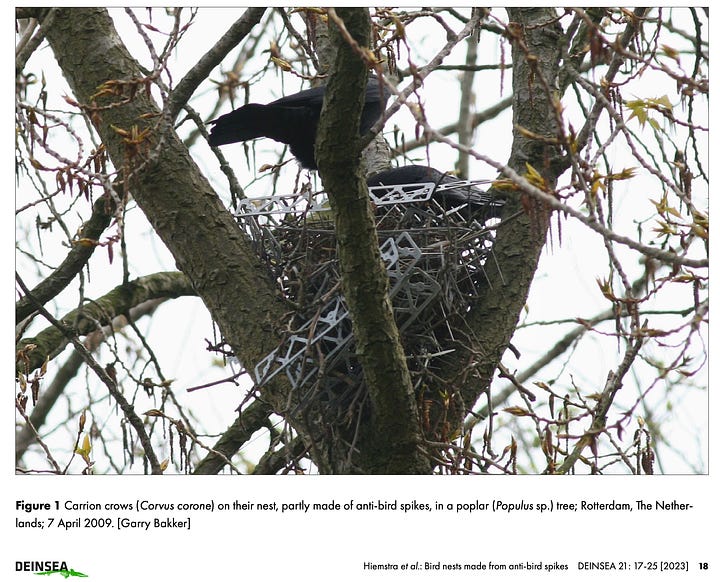A wonderful morning to you. Last week the enchanting snowfall in the Netherlands transformed the landscape into a winter wonderland. Perfect for some mountain biking in Limburg’s ‘mountains’ (a lofty 300 meters above sea level ;p). We pitched our tent atop the snow, and thanks to a fortress of layered clothing, we had a good night under the stars. Nothing beats being outside and going on adventure together.

For this edition of the newsletter we dive in the relationships between being outside and intelligence. I’ve selected three interesting bites for you:
- Human Intelligence: Forest Bathing Trips
- Artificial Intelligence: AI Binoculars – Swarovski’s AX Vision
- Natural Intelligence: Rebellious birds make nests out of anti-bird pins
1) Forest Bathing Trips
Human Intelligence

In Japan, a brief and relaxed visit to a forest is known as “Shinrinyoku,” which translates to forest bathing. This activity is considered akin to experiencing natural aromatherapy.
In a series of studies aimed at investigating the effect of forest bathing trips on human immune function, the researchers concluded forest bathing can significantly boost our immune system, such as increasing the count of white blood cells. This can last for up to 30 days after your forest bath.
While this is certainly good news for your immune system, our focus here is on intelligence*. And it may not be a surprise to you: nature can also influence our state of mind for the short and long term. There’s even a strong correlation with growing up in a green environment and a lower risk of mental disorders like depression and anxiety:
”Risk for subsequent mental illness for those who lived with the lowest level of green space during childhood was up to 55% higher across various disorders compared with those who lived with the highest level of green space. The association remained even after adjusting for urbanization, socioeconomic factors, parental history of mental illness, and parental age.”
Even our thoughts and ideas vary by environment. Being in a natural place, on average, leads to more positive and less impulsive thoughts. Interestingly, people are more inclined to think about the past while being in nature. In contrast, walking through a shopping center shifts attention more towards the future.
For me this shows once again we are not a totally autonomous individual and our way of thinking is influenced by the more-than-human world.
- Tip: Have your lunch break or small meeting outside today. Walk, sit, and enjoy. And how might you integrate nature into your daily routine?
2) AI Binoculars – Swarovski’s AX Vision
Artificial Intelligence
On my trips, I’m always on the lookout to spot wildlife like deer, hawks, or one of the beautiful orange-blue kingfishers that are located near my house. It’s a sport to know their names, but it can be difficult to remember everything and recognise the animals. That’s why the launch of Swarovski’s AI binoculars, AX Vision, in January ‘24, was so exciting to some spotters.
It’s basically an Augmented Reality binoculars which use deep learning to identify birds and animals. You spot the animal, take a picture and you’ll see the name of the animal displayed in the binoculars. At least, most of the times. If your view is partly blocked by branches or other obstacles the binoculars have trouble.
If you don’t want to spend $4,799 (!!!), or you think it takes part of the fun away, you can also use the Merlin Bird ID phone app (which actually powers the AX Vision), or apps like BirdNet and ObsIdentify for those moments you want AI to help out identifying the species.
Still not sure what my thoughts are: Does this make spotting easier and more exciting, or does it take away the fun?
3) Rebellious birds make nests out of anti-bird pins
Natural Intelligence
We end this newsletter with the incredible ingenuity and adaptability of birds to the human world.** Birds learned to make nests out of anti-bird pins… Nature always finds a way, and you can certainly call this intelligent behaviour*.

Biologists present the latest innovation in nest building: bird nests made from anti-nesting spikes. Researchers from Naturalis Biodiversity Center and the Natural History Museum Rotterdam collected these special nests for the first time and described this remarkable behavior in a scientific publication as ‘an ultimate adaptation to life in the city.’
Read more about it @ Naturalis Biodiversity Center or in the paper.
That’s it for now. Wish you the best adventures outside, thought-provoking questions and exciting discoveries. If you haven’t subscribed yet; press the button!
* For those definition lovers: defining intelligence is not an easy task. Let’s settle at something like: the ability to acquire and apply knowledge and skills – to learn from experience and to adapt to, shape, and select environments.
** By lack of better words I seperate humans from nature, but of course humans are nature. Any suggestions on how the put this vision in understandable words are welcome.

 English | EN
English | EN 